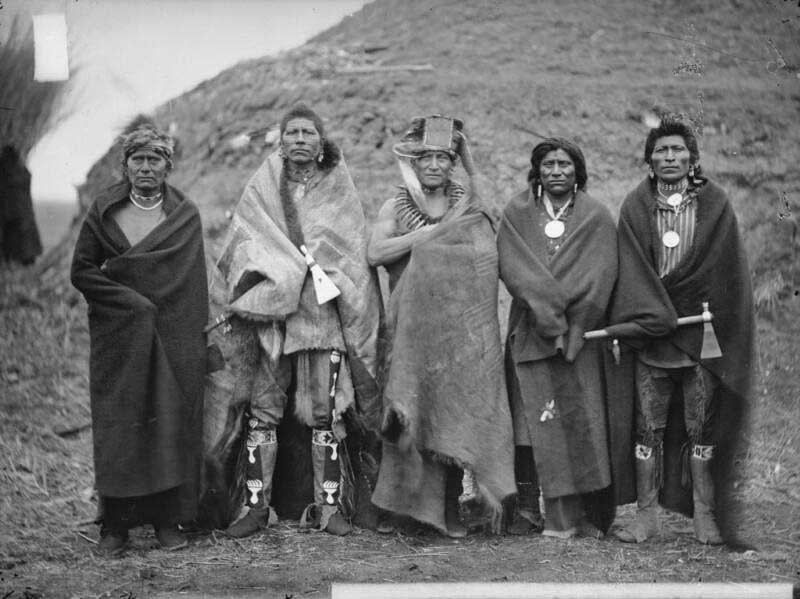
Sometime after he spent forty years as a missionary to the Pawnees, the Rev. Samuel Allis wrote up a memoir, a colorful record of the time he spent as a lay pastor touting salvation in Jesus to those who had never heard. Eventually, he worked also as a teacher and a linguist. Forty Years among the Indians and on the Eastern Borders of Nebraska recounts his difficulties, as well as those of the Pawnees, who were not as fierce and warlike as their neighbors, the Sioux, and therefore often suffered many a bloody attack.
Most Protestant missionaries who ventured into the backwoods of the continent in the early years of the 19th century were schooled back east by fiery abolitionists who carried a devotion laced up tight by fierce commitments to reshape the world for the King of Heaven and Earth, commitments those missionaries, like Rev. Allis, shared, in spades, intense, almost blinding commitments.
"An old Indian told me once he knew one of his tribe to whom appeared a beaver that wanted him to give the beaver his three sons," Allis remembers. It's a tale told by the Pawnees, and Allis can't help but bring it up, a very strange tale told by people who believed animals sometimes had important things to say.
The man had three fine boys, Allis says, repeating the story, the myth. The beaver very clearly spells out the terms: he gets the boys, but the man prospers, does very well in life.
That Allis is skeptical is obvious--not just of the beaver, but of the whole silly yarn.
Anyway, the father of three sons refuses the offer "for he loved his sons very much." The beaver then politely asks for two, and is, once again rebuffed, at which point that beaver leaves "very much dissatisfied."
That decision, Allis says, "bore heavily" on the father's mind too. He had trouble sleeping and began to have all kinds of bad luck until he reconsidered his options, at which time he even "consulted the Great Spirit," who let him know that he was not particularly happy with the man's seeming selfishness. So the man returned to the beaver and gave him just one of his beloved sons.
That's not the end of the yarn. The beaver's warm promises held true: the boy lived with the beaver for several years before he was returned to his father, "a fine looking fellow."
"I believe many Indians would improve their appearance in a similar way," Allis says, a bit of an unfeeling remark, somewhat tongue-in-cheek, but who am I to judge? "Probably," the missionary says, "like Nebuchadnezzar, he ate grass and his finger nails grew like eagle's claws."
So much for the beaver, the son, and the whole silly story.
But I couldn't help think of a story an old Navajo told me a decade ago, a Christian believer, in fact, who said he remembered the missionary coming to his family's hogan, then sitting there around the fire and talking, telling Bible stories maybe. "Once upon a time there were three young men who walked right into a fire and were not burned," he might have said.
When he'd leave, the old Navajo said, his father would shrug his shoulders as if the man was talking nonsense. "When will we eat?" he might well have said, looking at his wife.
There's danger and violence in Rev. Allis's old memoir too, but the simple stories of miscommunication may well be the most human.
2 comments:
Hello Dr. Schaap,
I am an undergraduate senior in Anthropology working on developing a project on the Rehoboth Christian Mission School and the way this school has changed cross-generationally with respect to the way Navajo and ultimately Native politics have changed throughout the 1900s. Particularly, I hope that this project can be helpful in determining a way to honor and remember its history in light of the activism and resilience that Native peoples have experienced across their lifetime and how Rehoboth can be mindful and respectful of the current activism happening now and in what ways this affects current students outside the classroom.
Please get back to me. I would really like to chat about historical background and perhaps the resources you used to study the history of Rehoboth.
Thank. you,
Jack Martin
Jack Martin, I just now read this comment, almost a year after you wrote it. I'd be honored to speak to you and give you any help I could. You can contact me through Facebook or at jschaap@dordt.edu. So sorry I didn't see this until now!!
Post a Comment